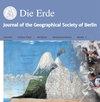环境正义的跨学科视角:整合主观信念和感知
IF 0.6
4区 地球科学
Q3 GEOGRAPHY
引用次数: 8
摘要
本文从跨学科和综合的角度,将地理学、环境政策和规划的理论和研究与正义心理学的方法相结合来考虑环境正义。这开辟了一个综合的观点,它考虑到感知和评价环境正义的社会和个人方面。从这个意义上说,环境正义的概念被视为话语过程、历史背景以及由认知评估过程和情感共同塑造的社会本土化和标准化的结果。此外,参与过程中的环境正义是在环境和可持续性政策及其实施的背景下考虑的,首先总结了参与过程的批评要点,然后讨论环境正义作为参与实践的一个方面。由此,在环境和可持续性政策和方案(例如,适应气候变化、城市规划、能源系统转型)的背景下,得出了一些对参与过程更加公正敏感的设计要点。这种跨学科的分析表明,环境正义不是“一个”的,而是基于不同概念和观念的多种想法和评估。本文章由计算机程序翻译,如有差异,请以英文原文为准。
An interdisciplinary perspective on environmental justice: integrating subjective beliefs and perceptions
In this paper, environmental justice is considered from an interdisciplinary and integrative perspective that combines theories and studies in geography, environmental policy and planning with a justice psychology approach. This opens up an integrated view, which takes into account both societal and individual aspects of the perception and evaluation of environmental justice. In this sense, notions of environmental justice(s) are seen as the result of discursive processes, historical contexts and a social localization and standardization that is shaped by both cognitive evaluation processes and emotions. Additionally, environmental justice in participation processes is considered in the context of environmental and sustainability policy and its implementation, first summarising the points of criticism of participation processes and then discussing environmental justice as an aspect of participation practice. From this, some key points for a more justice-sensitive design of participation processes in the context of environmental and sustainability policies and programmes (e.g. adaptation to climate change, urban planning, energy system transformation) are derived. This interdisciplinary analysis shows that there is not ‘one’ environmental justice, but a multitude of ideas and evaluations based on different concepts and perceptions.
求助全文
通过发布文献求助,成功后即可免费获取论文全文。
去求助
来源期刊

Erde
GEOGRAPHY, PHYSICAL-GEOSCIENCES, MULTIDISCIPLINARY
CiteScore
2.90
自引率
6.20%
发文量
0
审稿时长
>12 weeks
期刊介绍:
DIE ERDE is a publication of the Geographical Society of Berlin
DIE ERDE is a scientific journal in Geography, with four issues per year with about 100 pages each. It covers all aspects of geographical research, focusing on both earth system studies and regional contributions.
DIE ERDE invites contributions from any subfield of both Physical and Human Geography as well as from neighbouring disciplines.
 求助内容:
求助内容: 应助结果提醒方式:
应助结果提醒方式:


